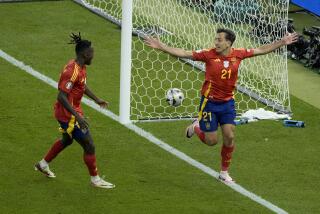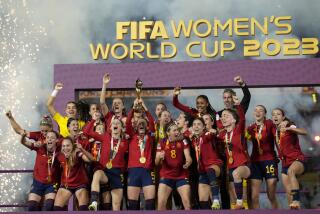Spain finds beauty in 1-0 championship victory over the Netherlands
Reporting from Johannesburg, South Africa — It was a night Spain will never forget. And one the Netherlands would do well not to remember.
Sunday’s World Cup final was supposed to be a display of the subtlety and grace of “beautiful football.” Instead, the Dutch destroyed it, displaying all the subtlety and grace of a street fight by earning nine yellow cards and a red card, a record for a World Cup final.
And when it ended in a 1-0 Spanish win on Andres Iniesta’s goal four minutes from the end of extra time, the winners hugged and wept and danced together on the field in front of 84,490 at Soccer City.
And the losers charged the referees.
“This success, being world champions, is a success for all of us,” said Spanish Coach Vicente del Bosque. “Spain deserves this triumph and this World Cup.”
Said Dutch Coach Bert Van Marwijk: “That’s not our style. I suppose it’s regrettable. But you play to win.”
So did Spain, of course. Only the Spaniards didn’t compromise themselves to do it despite the fact it was a victory the country had waited forever to celebrate.
The only other time Spain advanced beyond the quarterfinals at a World Cup was in 1950, when the tournament invited only 16 teams. But over the last three years Spain has enjoyed an unprecedented run, one that has included a European Championship and a 35-match unbeaten streak. Since Del Bosque took over for Luis Aragones following the Euros, Spain has lost just two of 33 matches.
The final win is the one that will be long remembered. And when it ended, goalkeeper Iker Casillas, the captain, wept as he was mobbed by teammates.
Iniesta, meanwhile, was overwhelmed by it all.
“I can’t quite believe it yet,” the Barcelona midfielder said. “I had the opportunity to score that goal, which was so important. It’s something absolutely incredible.”
Iniesta’s score came with the Dutch playing a man down after defender John Heitinga was sent off for earning a second yellow card 19 minutes into extra time. Even so, it seemed as if the World Cup final was headed for penalty kicks for the third time in the last five tournaments before Iniesta collected a sliding pass from Cesc Fabregas in the penalty area and volleyed a smash just past goalkeeper Maarten Stekelenburg and just inside the far post.
“I simply made a small contribution to my team in a match that was very rough,” Iniesta said. “There were all sorts of things happening on the pitch.”
And most of them involved the Dutch, who came into the match having earned only 13 cautions in their first six World Cup matches combined. They had five 12 minutes into the second half in the final.
British referee Howard Webb struggled mightily to gain control of the game, handing five yellow cards to the Spanish as well. But the Dutch, especially, never seemed to get the hint.
“It’s not our style, let me put it that way, to commit horrible fouls,” Van Marwijk said. “[But] I think both sides, also the Spanish, committed horrible fouls. I don’t think the referee controlled the match very well.”
The Dutch were most upset with Webb when he failed to caution Carle Puyol after the Spanish defender appeared to impede Arjen Robben at the end of a breakaway in the 82nd minute. The yellow card would have been Puyol’s second, which would have left Spain short-handed.
Instead it was Robben who wound up being booked for protesting.
“If you play a World Cup final, you need a world-class referee. I don’t know if today was a world-class performance from the referee,” said Robben, one of a handful of Dutch players who had to be pulled away from the officials after the match.
Rarely has the distinction between winners and losers been so stark following a World Cup final.
On one side of the pitch there was Spain, crediting teamwork for the fact it was hoisting the World Cup trophy despite scoring only eight goals in the tournament, fewest ever for a Cup champion. And on the other side was Holland, World Cup runner-up for the third time, its players blaming the referees and taking their second-place medals off before they had even left the awards platform.
“I’m not someone to look back at the referee,” said Van Marwijk, who was blistered at the post-match news conference for his team’s surprisingly aggressive play. “We did this to ourselves. It’s very, very bitter. It’s sad.”
But at least Van Marwijk got one thing right.
“Let me be clear,” he said. “The best team won.”







